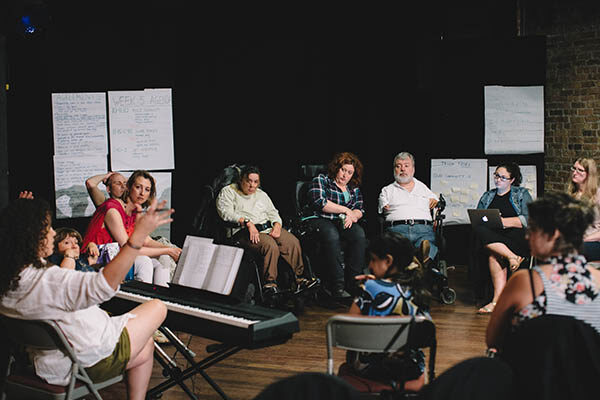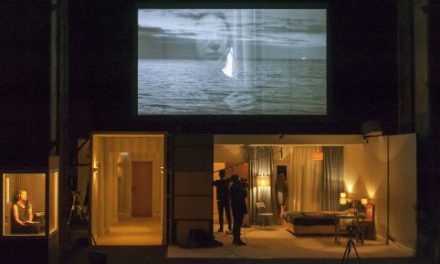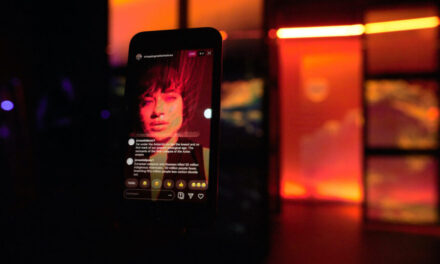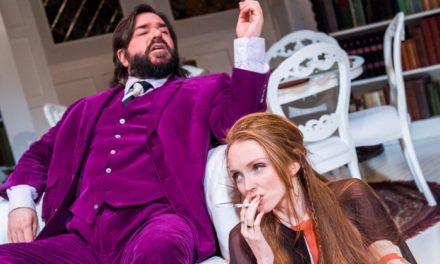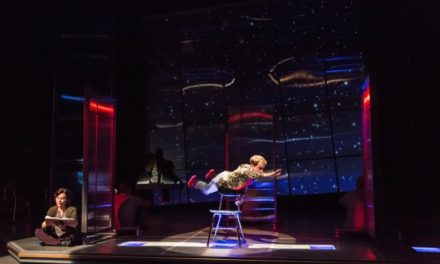Tekki Lomnicki is the artistic director of Tellin’ Tales Theatre, located in Chicago, and she has been with the theatre since it’s inception. TheTheatreTimes sat down with her to discuss the theatre company and to learn more about what programs are offered to those with disabilities.
How did Tellin’ Tales get to where it is today?
It all started 22 years ago when my friend Michael Blackwell asked me and our friend Nancy Shelton to write a play with him about a Southern Folk Artist he met on a bus. This African American woman had the most interesting stories and we interviewed her for hours and turned it into our play When Heck Was A Puppy. But before the play was officially completed we applied for an NEA (National Endowment of the Arts) grant. I was playing the woman (though white and a little person) in our grant video that we used for the application. The NEA said, “Wait a minute, why isn’t the woman talking about her disability?” Then boom—we got it! That was the key. Though the black/white thing didn’t matter—the disability thing did. I absolutely had to have the character talk about the disability. We merged my story with hers, and low and behold we got the grant the next year and produced the show in 1994 and again in 1995. It was a hit and brought personal storytelling to the forefront.
Then Michael invited Maggie Daley to see the show and though she couldn’t make it, she sent an assistant. Then she invited us to teach a summer workshop for middle schoolers with and without disabilities which eventually turned into the Gallery 37 program.
We incorporated in 1996 and applied for grants and then Michael moved to California and left the company.
I saw how kids really blossomed when one on one with a mentor and came up with the concept of Six Stories Up—pairing Six middle schoolers with six professional theater mentors to devise a musical. Also mixing ability with disability. That was in 1998 and we’re about to perform our 22nd incarnation.
Our show Six Stories Up In Climate Change opens September 28 (please read about it on our website Tellintales.org)
We are where we are today because we basically are the only ones who give both kids and adults with disabilities the chance to tell their stories—not only read them—but act them out on stage in a fully directed show.
Also, an amazing throng of volunteers and personal donors who believe in what we do. And this is not out of pity or what I call “Inspiration Porn”—but real excitement and admiration for what we do. We also now have a wonderful Managing Director (Judy Bergh) so I can really be Artistic Director and a robust Board of Directors.
How does Tellin’ Tales actively include those with disabilities on and off stage?
We are all inclusive. In our last show (Divercity) we had a deaf performer. Now I’m not sure if you know this but that show was written in a six-week class. In order to have the deaf person participate, we had to have sign language interpreters at each class and at all shows. Luckily we had a grant for the class and show from the CCT but we would have made sure to find the money if we didn’t. We also have crew members with disabilities and a huge audience with disabilities because they can see themselves in our stories. We always rent accessible spaces and have sign language interpretation and audio description.
What are some of the events (besides Divercity) that stand out to you as integral to Tellin’ Tales? What kind of programs does the theater offer?
Fillet Of Solo: Even though we do not produce this show, Lifeline Theatre has a large following.
In the past few years, I have made sure that we incorporate at least one solo performer other than myself to bring the disability experience to light to a mainstream audience. Many great connections have come from doing this show.
EveryBody Has A Story Workshop: I believe that there is a lack of solo performers with disabilities in Chicago, so this class is a training ground for adults who want to write and perform their stories. It is also a way for me to train these people to become teaching artists who can go into schools when we broaden our programs. Though there are many qualified teaching artists without disabilities, I feel it would be great to have more teachers with disabilities who can truly relate to kids with disabilities. Now that we have been partnering with St. Martin’s Church in the Austin neighborhood, it is an opportunity for us to have more of a racial mix as well.
Divercity is a wonderful opportunity to showcase the work of the students in the EveryBody Has a Story class and bring it to a mainstream audience. We always have a talkback and many audience members are blown away by how they were able to connect to the performers through their stories.
Solo Show is another chance to mix established solo performers with and without disabilities. This show appeals to a different crowd than Six Stories Up or Divercity. In the past few years, I have worked to have more of an ethnic mix as well as incorporating more performers with disabilities.
The Young Adult Writers Workshop and Reader’s Theater gives kids who have aged out of Six Stories Up a chance to continue to learn to write and perform. It is also a chance to incorporate young adults who have not gone through Six Stories Up. Nura Aly (a former apprentice) now mentors and produces the show and we have gained the attention of the Chicago Public Library, and are performing for their Disability Awareness Week for a second time.
The Disability Pride Parade is a goldmine of people with and without disabilities. We not only march in the parade, but we also have a booth packed with information. It’s a great way for people to learn about Tellin’ Tales, and express interest in participating in our programs or on a committee.
Our Hospital Program is a wonderful way to heal through storytelling. Though it is more of an intimate rather than public experience, it sheds light on how important it is for children with any kind of disability or illness to share their stories. We are lucky to have Lindsay Porter teach this program and she is now also going to coordinate it to
relieve Judy.
Six Stories Up is our flagship program, which incorporates my entire vision—from making sure people approach theater on an equal playing ground, and learning to write and perform to helping audiences connect with the performers through their stories. Last year we had a wonderful ethnic mix and I will be working on having a similar mix this year. My hope is to have a training workshop for mentors to help them better work with their apprentices.
The Musical: When approached by the artists who worked on the Lyric Opera show with us to create a full-length musical it felt like a logical stepping stone to bringing the magic of Tellin’ Tales and the talents of people with disabilities to light. We are determined to produce this show nationally.
Corporate Disability Awareness: These programs take our vision very public, helping to eliminate the stigma of hiring those with disabilities. These programs are evolving, however, our first one at BMO Harris Bank featuring solo performances by those from Divercity was very well received.
Tell me about how Divercity began, what it’s about, and what you hoped to gain from it.
Actually, the concept came from Bodies of Work, which is a consortium of theaters sponsored by the University of Illinois in Chicago. Carrie Sandahl asked me to teach a solo performance class comprised of only adults with disabilities. She felt that the stories would be deeper because we would all have a common bond. She was right! We performed that show at Access Living in 2012. Tellin’ Tales resurrected parts of that show in 2015 under the name Divercity and since then have had three more classes and three more shows. The class is called Everybody Has A Story.
I had hoped to gain deep authentic stories from people who might not ever have the opportunity to tell them. It has met every expectation and more…especially this last show. We have never had this much diversity before…a deaf person, a blind man, a lady with no arms, an amputee, two people with mental disabilities and many of these were also gay, veterans, parents, African Americans, and Latinos. That’s where the intersectionality comes in.
A crucial part of Divercity is intersectionality. How does disability fit in among other diversities?
I feel that disability is one of the last diversities to be mainstreamed. You see a movement now to have us in ads and on film but for example, there is still “Midget Wrestling” and “Dwarf Tossing”—which I know is limited to my disability. But people still feel that they can make fun of us or shun us for not being like them.
What do you envision the future of Tellin’ Tales to be like?
I envision it run by young people with disabilities who are passionate about including EVERYONE—and I mean everyone. I see us in schools and park districts and on national tours. Right now we are working on a national musical (like A Chorus Line), which will be a fictional musical about and played by people with disabilities—this is called Always Greener. We hope to premiere it in 2020.
In what ways do you feel the theater landscape needs to change to fully include those with disabilities? How can we get there?
I feel that more directors need to cast people with disabilities in mainstream roles. There are always these special casting calls now but now many of those who audition are cast! None of my friends have been cast and they’re really good. I think directors need to throw aside their biases and if they think perhaps someone has potential but not the experience—work with them!! That’s what I do. In Divercity I taught people who have never acted to get up there and act out their scenes—I showed no mercy. And by God—they did it!!!! I was so proud of them.
This post was written by the author in their personal capacity.The opinions expressed in this article are the author’s own and do not reflect the view of The Theatre Times, their staff or collaborators.
This post was written by Madison Parrotta.
The views expressed here belong to the author and do not necessarily reflect our views and opinions.

